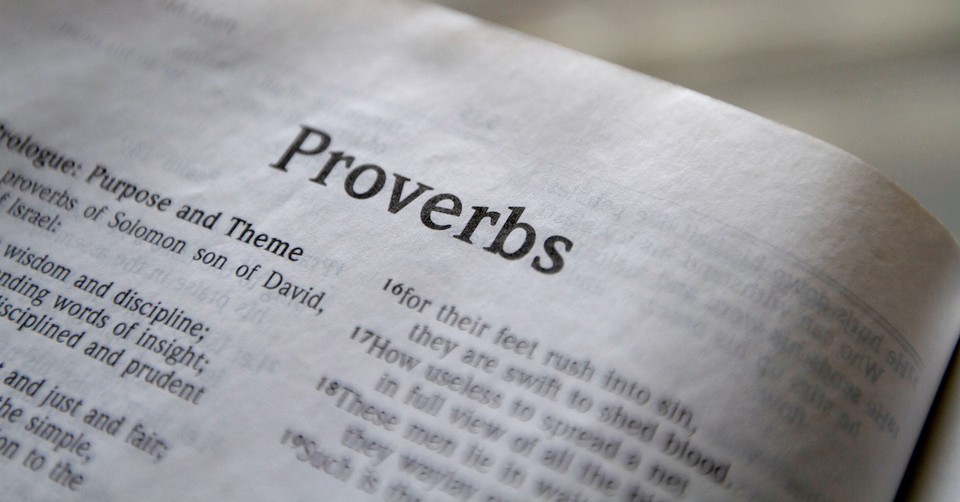Who Is the Author of the Book of Proverbs?

Do you ever wish life had guideposts--signs to tell you which way to go? To warn you about upcoming pitfalls? To point out the best paths? Amazingly, as believers, we have just such guideposts, compiled in the book of Proverbs.
The book of Proverbs is in the genre called Wisdom Literature, along with Job, Psalms, Ecclesiastes, and the Song of Songs. It is written to young people, sharing advice to instruct them on the art of living well in a fallen world.
Who Wrote the Book of Proverbs?
Proverbs was compiled by Solomon and is comprised of his own writings plus contributions from people known only as “the wise” (22:17–24:22; 24:23–34) as well as from Hezekiah’s men (25:1), Agur (30:1–33), and Lemuel (31:1–9). Regarding where the wisdom came from, we know the most about Solomon’s story. He pleased God at the beginning of his reign, and because of this, “the Lord appeared to Solomon in a dream” saying “‘Ask for whatever you want me to give you’” (1 Kings 3:5). Surprisingly, Solomon did not ask for anything that would benefit him materially, but instead humbly prayed:
“Now, Lord my God, you have made your servant king in place of my father David. But I am only a little child and do not know how to carry out my duties. Your servant is here among the people you have chosen, a great people, too numerous to count or number. So give your servant a discerning heart to govern your people and to distinguish between right and wrong. For who is able to govern this great people of yours?” (1 Kings 3:7-9).
God rewarded Solomon for this selfless reply: he gave him incredible wisdom along with wealth and honor. While the material blessings God gave proved to be a snare to Solomon for part of his life, he was able to do much good with his wisdom and ended up a chastened man by the time he wrote the book of Ecclesiastes later in life. Solomon’s wisdom was well-known in the world during his reign. For example, the Queen of Sheba traveled a long-distance “to test Solomon with hard questions” and was “overwhelmed” by the wisdom of his responses (1 Kings 10:1, 4).
Another vivid example of Solomon’s wisdom in action comes from 1 Kings 3. Two women who lived in the same house both had babies, and one of the babies died in the night with no one to witness it. Both women claimed that the living baby was hers, and they came to Solomon to settle the dispute. In order to force the truth into the open, Solomon acted as if he would cut the baby in two with a sword and give half to each woman. The woman who was truly the baby’s mother was horrified and said, “Please, my lord, give her the living baby! Don’t kill him!” But the lying woman brazenly said, “Neither I nor you shall have him. Cut him in two!” (1 Kings 3:26). In this way, Solomon was able to resolve the dispute and discern the true mother of the living child.
In essence, the book of Proverbs is a compilation of wise sayings written in a way that is easy to remember for those who desire to grow in wisdom. A given Proverb often contrasts two opposites, such as wisdom and folly, which are often anthropomorphized as two women by those names (Proverbs 1-9). Another common structure is to show the positive and negative consequences of certain opposite choices (many examples in Proverbs 10-12).
How Should Christians Read Proverbs?
The book of Proverbs is useful for Christians because it charts the paths of wisdom that generally characterize a life worth living. The principles contained in Proverbs are not a trite formula for success; we see in the books of Job and Ecclesiastes as well as in many other biblical stories that wise choices do not always equal freedom from negative circumstances--but it is a guidebook for a living a meaningful life which we can look back on with satisfaction in the end.
Christians should acknowledge that both Old and New Testament are careful to note that wisdom cannot be attained by mere human study but must be given by God through relationship with him. Wisdom is not merely information we should amass but a skill we must hone while walking with God on life’s path. We can rejoice that God is ready and willing to impart wisdom to us when we are humbly aware of our need for His help: “If any of you lacks wisdom, let him ask God, who gives generously to all without reproach, and it will be given him” (James 1:5).
3 Takeaways from the Book of Proverbs
Proverbs are written in such a way that they cover a variety of topics rapid-fire, rather than focusing on only one thing at a time. This shows the wide-ranging need for wisdom, but it can also be helpful to distill down some overarching themes we see throughout the book so as to apply them in our lives.
1. To be wise, stand in awe of God.
Any pursuit of wisdom begins with “the fear of the Lord” (Proverbs 1:7). This fear is not a terror of punishment but rather a worshipful “reverence and awe” (Hebrews 12:18-29) that puts us in the right posture of heart and frame of mind to “humbly accept the Word planted in [us]” (James 1:21). With this starting point, we stop talking and are ready to receive. In the book of Ecclesiastes, Solomon advises: “Go near [to God] to listen rather than to offer the sacrifice of fools, who do not know that they do wrong.
"Do not be quick with your mouth,
do not be hasty in your heart
to utter anything before God.
God is in heaven
and you are on earth,
so let your words be few.
A dream comes when there are many cares,
and many words mark the speech of a fool...Therefore, fear God” (Ecclesiastes 5:1-3, 7).
2. Be careful to whom you listen.
The book of Proverbs is full of warnings to choose advisers carefully, for “whoever walks with the wise becomes wise, but the companion of fools will suffer harm” (Proverbs 13:20). Seekers of wisdom are encouraged to listen carefully to parents (Proverbs 1:8) and to other people who are wise (Proverbs 15:2). On the contrary, they are to be suspect towards supposed friends who are actually “sinful men” who try to “entice” them through peer pressure to do wrong (Proverbs 1:10), as well as from adulterous women who try to seduce them (Proverbs 2:16).
3. Work diligently in order to be generous.
The book of Proverbs sees work as meaningful and urges seekers of wisdom to faithfully labor as an application of their awe of God: “The soul of the sluggard craves and gets nothing, while the soul of the diligent is richly supplied” (Proverbs 13:4). This diligence will lead to abundance, which must be shared in order to be life-giving. Hard work and accumulation of wealth are always seen by the book of Proverbs as an opportunity to love one’s neighbor. In the divine economy, “Whoever is generous to the poor lends to the LORD, and he will repay him for his deed” (Proverbs 19:17) and generosity itself begets more abundance: “A generous person will prosper; whoever refreshes others will be refreshed” (Proverbs 11:25).
As followers of God, we are not left without guidance to meander through life. Rather, we have been richly provided a guidebook that leads us in the beautiful paths that make it possible to live wisely and well even in a fallen world:
“Blessed is the one who finds wisdom,
and the one who gets understanding,
for the gain from her is better than gain from silver
and her profit better than gold.
She is more precious than jewels,
and nothing you desire can compare with her.
Long life is in her right hand;
in her left hand are riches and honor.
Her ways are ways of pleasantness,
and all her paths are peace.
She is a tree of life to those who lay hold of her;
those who hold her fast are called blessed” (Proverbs 3:13-18).
Source
ESV.org, 'Introduction to Proverbs'
Photo credit: ©Sparrowstock

Originally published December 31, 2020.







